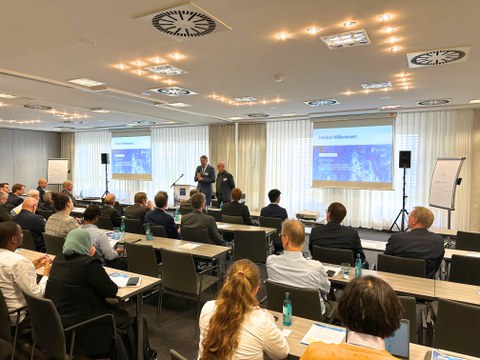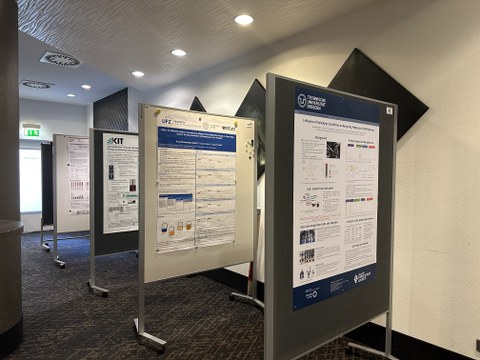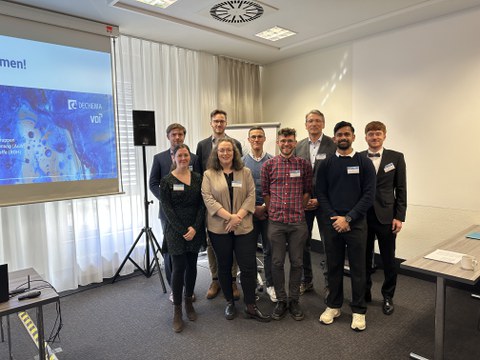Mar 24, 2025
Review: Annual meeting 2025 of the DECHEMA expert groups High Temperature Technology (HTT) and Waste Treatment and Materials Recovery (AuW)

Prof. Dr.-Ing. Michael Beckmann and Prof. Dr.-Ing. Thomas Kolb jointly opened the annual meeting of the DECHEMA specialist groups.
On March 17 and 18, the annual meeting of DECHEMA's High Temperature Technology (HTT) and Waste Treatment and Recycling (AuW) specialist groups took place at the Dorint Hotel in Dresden. The two-day event attracted over 75 participants from colleges, universities and companies from all over Germany, who discussed the current state of research and practice in their specialist groups.
The DECHEMA Expert Group Meeting 2025 began in plenary session with the opening by Professor Dr.-Ing. Michael Beckmann (TU Dresden) and Professor Dr.-Ing. Thomas Kolb (Karlsruhe Institute of Technology).
Two keynote speeches set the mood for the two well-filled days of the event: Professor Dr.-Ing. Bernd Neukirchen spoke about the history of the Waste Committee on the occasion of the 60th anniversary of the Waste Treatment and Recycling Division, including personal memories of some members who have been involved since the division was founded. In the second keynote speech, Professor Dr.-Ing. Dimosthenis Trimis (Karlsruhe Institute of Technology) focused on the topic of "Iron as an energy source and iron dust flames".

In addition to the presentations, there was also a poster exhibition at the DECHEMA expert group meeting.
Other contributions to the plenary event dealt with innovations for resource-efficient plastics recycling (Dipl.-Ing. Katja Wendler, DECHEMA e.V.), the role of high-temperature reactors in BASF's Net Zero program (Dr.-Ing. Grigorios Kolios, Dr.-Ing. Andrea Cristina Hurtado Rivera, Dipl.-Ing. Bernd Zoels, Dr.-Ing. Kai Ehrhardt, BASF SE, Ludwigshafen), the recycling of waste streams using the Müller-Kühne process (Leon Kaßner and Dr.-Ing.Philip Biessey, Ruhr University Bochum; Dr. Peter Fröhlich and Prof. Dr. Martin Bertau, TU Bergakademie Freiberg) and the topic "Energy rethought: Hydrogen strategy of an energy supplier for a sustainable, climate-friendly future" by Dr.-Ing. Michael Nolte and Dennis Kaczmarek (Iqony Solutions GmbH, Essen).
The afternoon program: Innovative approaches in the field of waste treatment, high-temperature technology and industrial energy transition
In the afternoon, the Waste Treatment and Resource Recovery (AuW) specialist group dealt with current challenges in the areas of PFAS/fluorine/mixed polymer waste and waste incineration. Under the direction of Dipl.-Ing. Markus Gleis (Federal Environment Agency, Dessau-Roßlau), studies on the incineration of fluorine-containing waste (Dr.-Ing. Hans Joachim Gehrmann, Karlsruhe Institute of Technology), the disposal of PFAS (Dr. Boris Ufer and Florian Grote, Abfall-Verwertungs-Gesellschaft mbH, Hamburg) and the chemical recycling of mixed plastic waste (Fabian Roweda, M.Sc., RWTH Aachen) were presented.
After a short break, Prof. Dr.-Ing. Rudi H. Karpf (ete.a Ingenieurgesellschaft, Lich) moderated the topic of waste incineration. An analysis of German waste incineration plants (Dr.-Ing. Roman Maletz, TU Dresden), results from the "CHP 4.0" research project on increasing the flexibility of CHP plants (Thaddäus Weniger, M.Sc.) and the planning of a hazardous waste incineration plant (Dipl.-Ing. Jessica Thiess, Dr. Born - Dr. Ermel GmbH, Frankfurt) were discussed.

The EVT team at the annual conference of the AuW and HTT specialist groups. In addition to their own contributions, they ensured that the conference ran smoothly.
The High Temperature Technology (HTT) specialist group highlighted current developments in the cement industry and the energy transition in the industry. Under the direction of Dr. Karl Lampe (Ennigerloh), approaches to efficient CO₂ separation in cement production using oxyfuel technology (Dr.-Ing. Theodor Beisheim, thyssenkrupp Polysius, Beckum), operating experience with a digital twin in the cement pyro-process (Dr.-Ing. Martin Weng, aixprocess, Aachen) and modular synthesis gas plants for the recycling of carbonaceous residues (Roland Möller, Ecoloop GmbH, Traunstein) were presented.
Jochen Kellenbenz (BASF SE, Ludwigshafen) then moderated the presentations on the industrial energy transition. The participants spoke about sustainability projects to decarbonize a 100 MW site (Dr. Stefan Rumpel, Evonik), high-temperature processes in the petrochemical industry (Felix Harnack, Schmidtsche Schack/ ARVOS GmbH, Kassel) and the BASF process for methane pyrolysis as a potential route to low-CO₂ hydrogen production (Andrea Hurtado, BASF SE, Ludwigshafen).
The advisory board meetings of the two specialist groups rounded off the first day of the event and led seamlessly into an evening event, which was used for socializing and networking.
Further contributions from the AuW and HTT specialist groups on the second day of the event
The second day of the annual meeting of the specialist groups was just as successful as the opening day the day before. The Waste Treatment and Resource Recovery (AuW) specialist group , led by Dr. Julia Vogel (Federal Environment Agency, Dessau-Roßlau) and Professor Dr. Martin Bertau (TU Bergakademie Freiberg), focused on the topics of waste pyrolysis and resource recovery, while the High Temperature Technology specialist group, led by Prof. Dr.-Ing. Dieter Stapf (Karlsruhe Institute of Technology) and Professor Dr.-Ing. Thomas Kolb (Karlsruhe Institute of Technology), spoke about processes and fundamentals. In this context, Matteo Giesen, M.Sc., from the Chair of Energy Process Engineering, gave his presentation on "Spectroscopic investigation of the ignition and combustion behavior of biogenic residues", which was very well received.
Our conclusion: knowledge exchange, networking and good cooperation as the basis for sustainable research and industry
The DECHEMA Annual Meeting 2025 of the High Temperature Technology (HTT) and Waste Treatment and Recycling (AuW) specialist groups in Dresden was a complete success for everyone involved. We hope that the participants gained valuable insights and will be able to deepen these in their companies and universities.
We would like to thank all advisors and participants for their contributions and inspiring discussions, the EVT team for their support on site and the organizer Juliane Jentschke, M.A., for her commitment and dedication to the success of the event.
